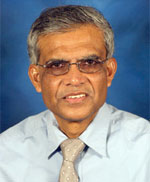 |
Fellow IET (UK), Fellow IEEE (USA)
Website: http://uwf.edu/mrashidEmail: |
Muhammad H. Rashid is employed by the University of West Florida as a Professor (and Past Director from 1997-2007) of Electrical and Computer Engineering. Dr. Rashid received B.Sc. degree in Electrical Engineering from the Bangladesh University of Engineering and Technology, and M.Sc. and Ph.D. degrees from the University of Birmingham in UK. Previously, he worked as Professor of Electrical Engineering and the Chair of the Engineering Department at Indiana University- Purdue University at Fort Wayne. Also, he worked as Visiting Assistant Professor of Electrical Engineering at the University of Connecticut, Associate Professor of Electrical Engineering at Concordia University (Montreal, Canada), Professor of Electrical Engineering at Purdue University Calumet, and Visiting Professor of Electrical Engineering at King Fahd university of Petroleum and Minerals (Saudi Arabia), as a design and development engineer with Brush Electrical Machines Ltd. (England, UK), a Research Engineer with Lucas Group Research Centre (England, UK), a Lecturer and Head of Control Engineering Department at the Higher Institute of Electronics (Malta).
Dr. Rashid is actively involved in teaching, researching, and lecturing in power electronics. He has published 17 books and more than 130 technical papers. His books are adopted as textbooks all over the world. His book, Power electronics has translations in Spanish, Portuguese, Indonesian, Korean, Italian, Chinese, Persian, and Indian edition. His book, Microelectronics has translations in Spanish in Mexico and in Spain, Italian, and Chinese.
He has had many invitations from foreign governments and agencies to give keynote lectures and consult, by foreign universities to serve as an external examiner for undergraduate, master's and Ph.D. examinations, by funding agencies to review research proposals, and by U.S. and foreign universities to evaluate promotion cases for professorship. Dr. Rashid has worked as a regular employee or consultant in Canada, Korea, United Kingdom, Singapore, Malta, Libya, Malaysia, Saudi Arabia, Pakistan, and Bangladesh. Dr. Rashid has traveled to almost all States in USA and many countries to lecture and present papers (Japan, China, Hong Kong, Indonesia, Taiwan, Malaysia, Thailand, Singapore, India, Pakistan, Turkey, Saudi Arabia, United Arab Emirates, Qatar, Libya, Jordan, Egypt, Morocco, Malta, Italy, Greece, United Kingdom, Brazil, and Mexico).
He was a registered Professional Engineer in the Province of Ontario (Canada), and a registered Chartered Engineer (UK). He is a Fellow of the Institution of Electrical Engineers (IEE, UK) and a Fellow of the Institute of Electrical and Electronics Engineers (IEEE, USA). He was elected as an IEEE Fellow with the citation “Leadership in power electronics education and contributions to the analysis and design methodologies of solid-state power converters.” Dr. Rashid is the recipient of the 1991 Outstanding Engineer Award from The Institute of Electrical and Electronics Engineers (IEEE). He received the 2002 IEEE Educational Activity Award (EAB) Meritorious Achievement Award in Continuing Education with the following citation "for contributions to the design and delivery of continuing education in power electronics and computer-aided-simulation". He is the recipient of the 2008 IEEE Undergraduate Teaching Award with citation: For his distinguished leadership and dedication to quality undergraduate electrical engineering education, motivating students and publication of outstanding textbooks
Dr. Rashid is an ABET program evaluator for electrical and computer engineering (and also from 1995-2000) and an engineering evaluator for the Southern Association of Colleges and Schools (SACS, USA). He is the Series Editors of Power Electronics and Applications, and Nanotechnology and Applications with the CRC Press. He serves as the Editorial Advisor of Electric Power and Energy with Elsevier Publishing. He lectures and conducts workshops on Outcome-Based Education (OBE) and its implementations including assessments. He is a Distinguished Lecturer for the IEEE Education Society and a Regional Speaker (previously Distinguished Lecture) for the IEEE Industrial Applications Society.
Developments and Trends in Electronics: Tubes to Memristors
The age of electronics began with the invention of the first amplifying device, the triode vacuum tube, by Fleming in 1904. Since then, electronics has been developing continuously over the years and are finding increasing applications. We encounter electronics in our daily life in the form of telephones, radios, televisions, audio equipments, home appliances, computers, and equipments for industrial control and automation. Electronics have become the stimuli for and an integral part of modern technological growth and development.
Traditional electronics use inorganic conductors. The inorganic materials such as silicon, gallium arsenide semiconductors, silicon dioxide insulators, and metals such as aluminum and copper have been the backbone of the modern semiconductor industry. Organic materials are being used as conductors in organic and biomedical electronics. A new type of element known as memristor may lead to the invention of a new class of high-density devices. This presentation reviews the chronological development of electronic circuits and discusses the futures trends.